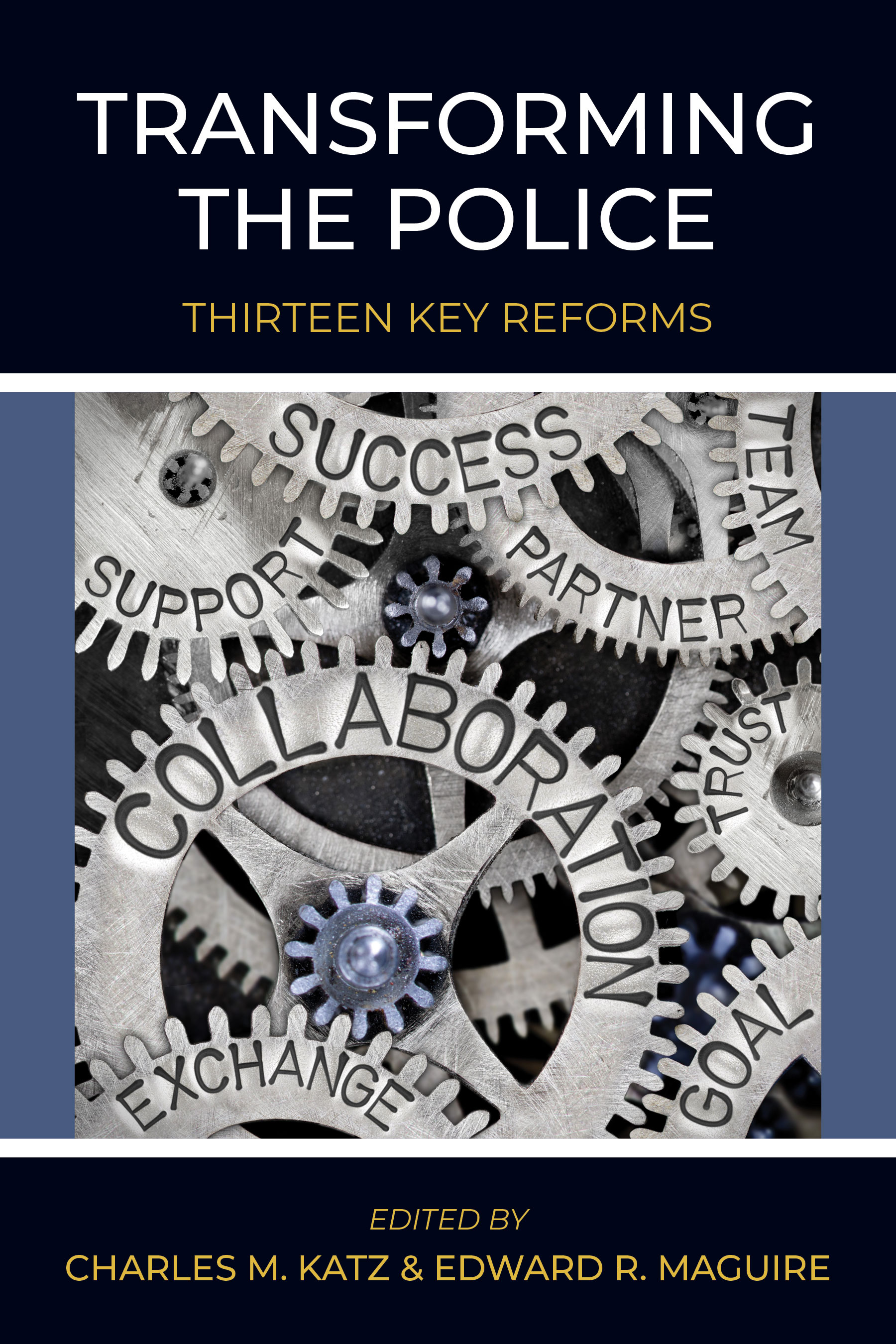
271 pages, $37.95 list
1-4786-3998-9
978-1-4786-3998-5
© 2020
paperback
eBook availability
Similar Titles
Transforming the Police
Thirteen Key Reforms
Policing in the United States is at a crossroads; decisions made at this juncture are crucial. With the emergence of evidence-based policing, police leaders can draw on research when making choices about how to police their communities. Who will design the path forward and what will be the new standards for policing? This book brings together two qualified groups to lead the discussion: academics and experienced police professionals.
The School of Criminology and Criminal Justice at Arizona State University recruited faculty with expertise in policing and police research. This volume draws on that expertise to examine 13 specific areas in policing. Each chapter presents an issue and provides background before reviewing the available research on potential solutions and recommending specific reform measures. Response essays written by a current or former police leader follow each chapter and reflect on the recommendations in the chapter.
The 13 chapters and response essays present new thinking about the police, their challenges, and the reforms police agencies should consider adopting. Policy makers, practitioners, educators, researchers, students and anyone interested in the future of policing will find valuable information about: the benefits of adopting evidence-based policing; leading strategic crime-control efforts; instituting procedural justice to enhance police legitimacy; reducing use of force; combatting racially biased policing; establishing civilian oversight; implementing a body-worn camera program; creating sentinel event reviews; developing police-university collaborations; facilitating organizational justice in police departments; improving officer health and wellness; handling protests; and increasing the effectiveness of police responses to sexual assault.
The School of Criminology and Criminal Justice at Arizona State University recruited faculty with expertise in policing and police research. This volume draws on that expertise to examine 13 specific areas in policing. Each chapter presents an issue and provides background before reviewing the available research on potential solutions and recommending specific reform measures. Response essays written by a current or former police leader follow each chapter and reflect on the recommendations in the chapter.
The 13 chapters and response essays present new thinking about the police, their challenges, and the reforms police agencies should consider adopting. Policy makers, practitioners, educators, researchers, students and anyone interested in the future of policing will find valuable information about: the benefits of adopting evidence-based policing; leading strategic crime-control efforts; instituting procedural justice to enhance police legitimacy; reducing use of force; combatting racially biased policing; establishing civilian oversight; implementing a body-worn camera program; creating sentinel event reviews; developing police-university collaborations; facilitating organizational justice in police departments; improving officer health and wellness; handling protests; and increasing the effectiveness of police responses to sexual assault.
Reactions
“It’s a unique and incredibly relevant text that our graduate students, most of whom are professionals in the criminal justice system, will appreciate.” — Jace Valcore, University of Houston
Introduction (Edward R. Maguire and Charles M. Katz)
1. Adopt Evidence-Based Policing (Cody W. Telep and A. Johannes Bottema)
Response Essay (Chief Jim Bueermann)
2. Implement Collaborative Strategic Crime Control Initiatives (Charles M. Katz and Jessica Huff)
Response Essay (Chief Art Acevedo)
3. Institutionalize Procedural Justice (Michael D. Reisig)
Response Essay (Chief Theron Bowman)
4. Reduce Use of Force (William Terrill)
Response Essay (Chief Michael L. Brown, PhD)
5. Reduce Racial Inequality in Police Practices (Danielle Wallace, Carlena Orosco, and Brooks Lauton)
Response Essay (Chief Calvin Williams)
6. Options for Increasing Civilian Oversight of the Police (Scott H. Decker and John A. Shjarback)
Response Essay (Sheriff Margo L. Frasier)
7. Implement a Body-Worn Camera Program (Michael D. White, Janne E. Gaub, and Natalie Todak)
Response Essay (Edward A. Flynn)
8. Improve Prevention of Police-Involved Harm through Sentinel Event Reviews (Michael S. Scott)
Response Essay (Chief David W. McGill)
9. Build Police-Researcher Partnerships to Advance Policing (Vincent J. Webb, Charles M. Katz, and Michaela R. Flippin)
Response Essay (Captain Ivonne Roman)
10. Build Momentum for Police Reform through Organizational Justice (Rick Trinkner and David H. Tyler)
Response Essay (Chief Eric Jones)
11. Promoting Officer Health and Wellness (Edward R. Maguire, Logan J. Somers, and Kathleen E. Padilla)
Response Essay (Chief Steven Pitts)
12. Improve the Policing of Crowds (Edward R. Maguire, Natasha Khade, and Victor Mora)
Response Essay (Chief Superintendent Owen West)
13. Increase Efficacy of Police Response to Sexual Assaults (Cassia Spohn and Suzanne St. George)
Response Essay (Chief Mike Brown)
1. Adopt Evidence-Based Policing (Cody W. Telep and A. Johannes Bottema)
Response Essay (Chief Jim Bueermann)
2. Implement Collaborative Strategic Crime Control Initiatives (Charles M. Katz and Jessica Huff)
Response Essay (Chief Art Acevedo)
3. Institutionalize Procedural Justice (Michael D. Reisig)
Response Essay (Chief Theron Bowman)
4. Reduce Use of Force (William Terrill)
Response Essay (Chief Michael L. Brown, PhD)
5. Reduce Racial Inequality in Police Practices (Danielle Wallace, Carlena Orosco, and Brooks Lauton)
Response Essay (Chief Calvin Williams)
6. Options for Increasing Civilian Oversight of the Police (Scott H. Decker and John A. Shjarback)
Response Essay (Sheriff Margo L. Frasier)
7. Implement a Body-Worn Camera Program (Michael D. White, Janne E. Gaub, and Natalie Todak)
Response Essay (Edward A. Flynn)
8. Improve Prevention of Police-Involved Harm through Sentinel Event Reviews (Michael S. Scott)
Response Essay (Chief David W. McGill)
9. Build Police-Researcher Partnerships to Advance Policing (Vincent J. Webb, Charles M. Katz, and Michaela R. Flippin)
Response Essay (Captain Ivonne Roman)
10. Build Momentum for Police Reform through Organizational Justice (Rick Trinkner and David H. Tyler)
Response Essay (Chief Eric Jones)
11. Promoting Officer Health and Wellness (Edward R. Maguire, Logan J. Somers, and Kathleen E. Padilla)
Response Essay (Chief Steven Pitts)
12. Improve the Policing of Crowds (Edward R. Maguire, Natasha Khade, and Victor Mora)
Response Essay (Chief Superintendent Owen West)
13. Increase Efficacy of Police Response to Sexual Assaults (Cassia Spohn and Suzanne St. George)
Response Essay (Chief Mike Brown)